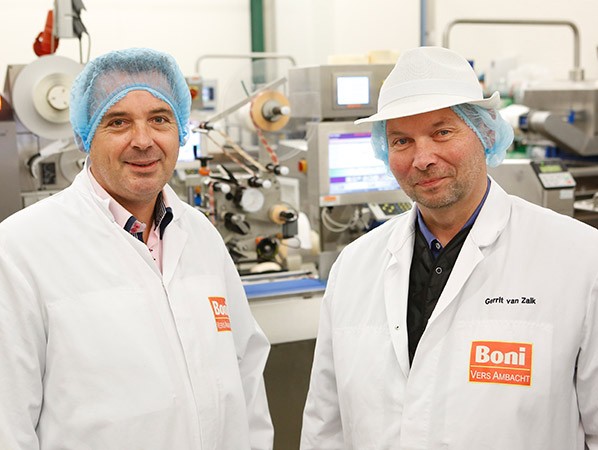
Meat company Boni Vers Ambacht in Nijkerk and Espera, manufacturer of weighing and price labelling machines in Eindhoven, have known each other for a long time, but their collaboration really kicked off when important changes in the statutory regulations for labels were expected.
In 2008, Gerrit van Zalk was the Fresh Meat Category Manager at Boni. In that year, he approached the top of the Boni concern with the idea of adding a centralised butcher division. The green light was given and the butcher division Boni Vers Ambacht was a fact by 2010. Van Zalk opted for a unique approach. "It was our objective to maintain and improve the quality of fresh meat products in our stores and to manage this within our own chain. We get our supply of regular beef through our collaboration with the Veurink family in Rheeze, who keep Limousin cattle. The animals are slaughtered by VIT, which is paid for by us. We meet with the farmer and VIT and agree on a price based on the cost price. We also organised similar short chains for pigs - the 'Vallei' pork - and poultry - the 'Comfort' chicken. Thanks to this approach, we have complete control over sustainability and quality. We have a say in every aspect, from the fodder to the processing of manure and the genetics."
Every day, Boni Vers Ambacht supplies the 45 Boni supermarkets with fresh meat. And every day, the slaughterhouse delivers fresh pork and chicken, whereas the beef is delivered in Nijkerk three times a week. Here, the 60 employees portion the meat after which it is packaged, weighed, and labelled. The production is based on orders. The stores send in their orders at 08:30 and by 16:30 everything is ready to be transported.
The number of Boni supermarkets has grown and there is a new buyer as well: online supermarket Picnic. More than 70 tons of meat find their way to the supermarkets and the Picnic delivery vans every week. Van Zalk: "Our approach, with fixed suppliers, fixed prices, extra focus on quality, sustainability, and animal welfare is an investment, but this form of chain control allows us to increase our cost efficiency. We want to keep the purchasing of meat affordable for a wider public while, at the same time, making sure that both the farmer/fattener and the retailer can earn a decent living".
Espera fits in perfectly with this efficient work method, says Mischa Schmitz, Sales Manager at the weighing, labelling, and printing systems specialist. Van Zalk confirms this: "During the planning process for this structure in 2008, we were already talking to Espera. We didn't manage to form a collaboration at the time, but we did recognise their quality. A few years later, we decided to revise our labelling. According to statutory requirements, the label needs to include information on allergens in a different font, or at least in a different typography. Due to software issues, our first supplier was unable to do this. Another problem was working with fixed weights."
Schmitz: "We were able to take this on. We had maintained contact and saw this as a golden opportunity". The first machine Espera used for Boni Vers Ambacht was a weighing/price labelling machine of the ES 7011 Advanced Edition line. This machine offers a weighing function and a top and bottom printer and has an integrated dispenser for the price labelling of the packages based on variable weights and fixed weights (e-weighing). Additionally, they provided the Esprom software package for the proper machine settings. This package is standard for the monitoring of a minimum of 20 machines and works perfectly with the ERP package that Boni Vers Ambacht uses.
Van Zalk: "We started with a first line, as a test for the transition to a new supplier. The results were great and so we installed already our fourth Espera machine last year. The reliability of the machines and the excellent and fast service Espera provides played a major role in our choice. When there is a disruption in the process, we can often fix this ourselves via a reboot. And if we cannot manage it ourselves, Espera can access the system from Eindhoven. A quick solution is vital for us, as we need to move on. We don't keep any stock and the stores open every day at 8 AM". The machines are very user-friendly: the changing of labels is fully automated and the settings are easy to adjust by the employees. The transfer resulted in more than a correct and carefree labelling process: the new Espera machines contributed to the improvement of the productivity. The increase in productivity is nearly 30%. Van Zalk and Schmitz couldn't agree more: it has been a very successful transfer.
Source: © Ton Kastermans